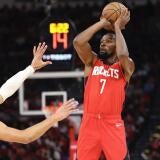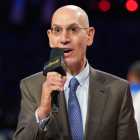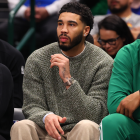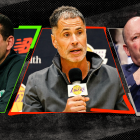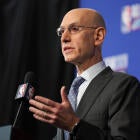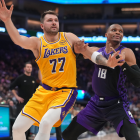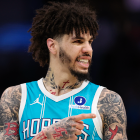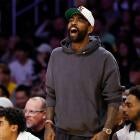How Team USA's Olympic roster will differ from its FIBA World Cup squad
Team USA will likely bring a more experienced roster to Paris
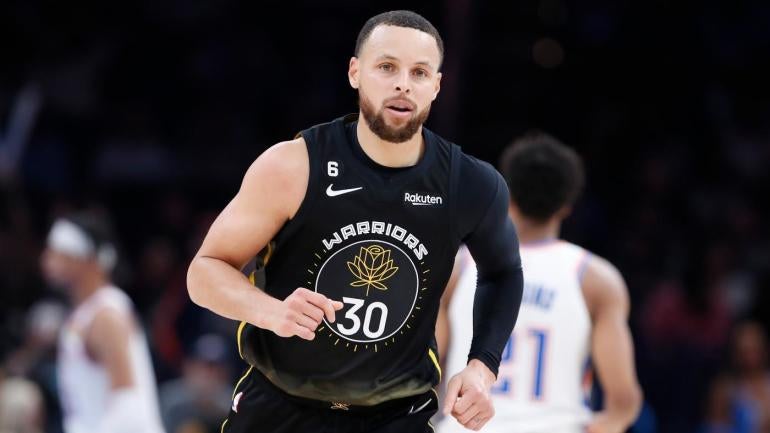
Yes, Team USA lost its chance at a World Cup gold medal on Friday in its loss to Germany, but USA Basketball shouldn't be all that surprised. In six 21st-century World Cups, Team USA has won only twice. There's a fairly simple explanation for why: they tend to bring the B-Team. Steve Kerr brought only three All-Stars to the Philippines: Anthony Edwards, Tyrese Haliburton and Jaren Jackson Jr., and all three of them made it for the first time last season. Nobody on the roster is in their 30s.
This is how it tends to go at the World Cup. While foreign countries tend to build programs on continuity, Team USA rarely has any. The biggest stars don't want to make multi-year commitments and older players are usually either too busy or too tired from the season to play in consecutive summers, so they prioritize the Olympics and Team USA grabs the best young talent it can muster. In a perfect world, a few of those young players stand out and make it onto the Olympic roster, but generally, those roster slots are hoarded by more experienced stars.
The downside of that approach played out on Friday. Germany has most of the same team that took bronze at EuroBasket last summer. It has continuity Team USA simply can't match. If the Americans are going to win gold in Paris, it is going to have to come on the basis of talent. So let's take a look at what might change at the Olympics as Team USA builds a roster that can hopefully do what the World Cup team couldn't.
The courting of the MVP
Team USA's loss to Lithuania pointed to a larger, disturbing trend within USA Basketball. The United States no longer produces the world's best big men. Jackson frequently gets into foul trouble, and then Team USA's options are Paolo Banchero, a rookie forward masquerading as a center, and Bobby Portis, an NBA reserve. Lithuania killed Team USA on the glass. So did Montenegro. There's only one obvious answer to that problem, and he's Cameroonian.
Each team is allowed to bring one naturalized citizen to FIBA competitions. Joel Embiid is a naturalized American citizen, and there is a precedent for Team USA relying on a foreign-born big man, as Hakeem Olajuwon won gold for Team USA in 1996. Embiid has expressed interest in playing in the Olympics, though he hasn't made a commitment. Even if he does, Team USA isn't his only option. Embiid is also a naturalized French citizen, and his decision may well determine who wins gold in Paris.
Remember, France not only has Rudy Gobert already, but has Victor Wembanyama waiting in the wings. Team USA can't compete with that three-headed monster inside. But if Embiid suits up for the Americans? Suddenly the front-court battle looks a whole lot more even, and Team USA's superior perimeter talent can carry it the rest of the way. Steve Kerr's roster decisions, to some extent, will be based on whether or not he can land the MVP.
Pickings aren't exactly slim after Philadelphia's center. Chet Holmgren just played for the Select Team, and Evan Mobley wore red, white and blue in both the U-17 and U-19 World Cups in the past. But neither is particularly well-suited to deal with Embiid, let alone Nikola Jokic should he suit up for Serbia. Myles Turner and Brook Lopez played for Team USA at the 2019 World Cup, but it didn't go well. Anthony Davis and Bam Adebayo have been there and done that already, and given his injury issues, Davis likely won't ever play in international competition again. Team USA will be able to find good players at center, but landing on the right ones is a far greater challenge.
Strength in numbers
Unspoken in Kerr's appointment as Team USA's coach was presumably the hope that he could lure perhaps the greatest American player to never compete in the Olympics. Stephen Curry won two gold medals for Team USA, but both were at the World Cup. Embiid is the most important target for Team USA given positional scarcity, but Curry is probably the best player conceivably available to Kerr. Curry has expressed interest publicly, but there's a reason LeBron James hasn't played since 2012. Superstars of their caliber have endless demands on their time.
Curry isn't the only Warrior in the mix here. Draymond Green is a two-time Olympian and might be the best American answer to Embiid and Jokic. Klay Thompson played in 2016, and Team USA almost always has a designated sniper or two on the roster. If either are interested, Kerr would probably love to bring Warriors players he is comfortable with to Paris. The greatest American Olympian of them all is a former Warrior as well, but there's no telling how interested Kevin Durant might be in a fourth gold medal.
To circle back to those pesky big men, don't rule out Kevon Looney as a front-court sleeper. Yes, it sounds crazy, but if rebounding is Team USA's biggest weakness, it should be noted that Looney had the highest rebounding rate in the NBA last season among qualifying Americans. He's a limited player, but he'll hold his own on the glass against anyone, and there's a rich history of non-stars making and even contributing to gold medal teams. Tayshaun Prince played in 2008, Andre Iguodala and Tyson Chandler played in 2012, Harrison Barnes suited up in 2016 and JaVale McGee (a former Warrior!) played in 2021. Someone unexpected is going to make this roster, and Looney fills an obvious need.
Olympic alums vs. World Cup challengers
Some players on the 2023 World Cup team have acquitted themselves well enough to earn consideration for 2024. Anthony Edwards seems like a virtual lock if he wants to play. Tyrese Haliburton and Mikal Bridges have both made strong impressions in the star class, and Austin Reaves and Josh Hart have stood out among the less famous group. Jackson is a candidate simply by virtue of Team USA's limited center depth, but Banchero would probably have to squeeze into a crowded forward class.
Jalen Brunson hasn't done anything wrong, but Team USA is so deep at guard that he'd likely have a hard time making the cut. Portis and Walker Kessler were necessary depth up front, but Kerr can probably do better next summer. Cam Johnson sadly gets crowded out by better scoring forwards, and Brandon Ingram has probably played his way out of Olympic consideration.
Of course, these aren't the only Team USA players to warrant consideration if they want it. If anything, there's far stiffer competition among 2021 Olympians. McGee, Jerami Grant and Keldon Johnson likely lose out on talent, and Khris Middleton's injuries will probably compel him to sit out by choice. Everyone else, though, has reasonable arguments. If we're looking for superstars in their prime, Devin Booker and Jayson Tatum seem like locks if they want to suit up. Jrue Holiday is still the best American perimeter defender, so he can make a strong case as well. Is Damian Lillard willing to play in the summer in which he turns 34? Did Zach LaVine do enough to prove himself in Tokyo, and can he stay healthy?
Between those two teams, there are already more viable candidates than available roster spots... and we haven't even touched on the Select Team that practiced and scrimmaged with Team USA before the World Cup. By all accounts, Cade Cunningham stood out in that group, but Holmgren's size makes him a reasonable option as well if his rookie year goes as we expect.
There are other big names that are theoretically on the table, but appear unlikely. Age and injuries likely take James, Davis, Kawhi Leonard, Paul George and Zion Williamson off of the table. Jaylen Brown and Donovan Mitchell played on the 2019 World Cup team and De'Aaron Fox competed for a spot on it, but as they haven't suited up since, it appears as though neither is prioritizing Team USA at this stage. Ja Morant has some image rehab to do before Team USA will let him wear the red, white and blue.
So what does an ideal Team USA roster look like?
As we've covered, Curry and Embiid are the two biggest priorities. As a combination, they'd make Team USA's offense effectively unguardable. Post-play and shooting reign supreme in FIBA settings, and these two are the best in the world at their respective crafts. After those two, we can fill out the starting lineup with the three best players from the 2021 Olympic team: Devin Booker, Jayson Tatum and Kevin Durant. Good luck stopping those five. As we've covered, Edwards is a lock if he wants to play, so he'll be the sixth man.
With the core of the roster now set, it's time to focus on roles. Bridges is the obvious choice as our forward stopper and extra shooter. The guard stopper is a tougher decision. Holiday leads the pack for now, but he'll turn 34 before the Olympics begin and can become a free agent next offseason, so he may simply be focused on other things. Derrick White's size poses problems against FIBA teams that are eager to post up smaller guards. Alex Caruso can guard any non-center on the planet, but he brings so little to the table on offense that he's probably a tough sell here. Marcus Smart is better on offense, but struggled in the 2019 World Cup. We'll give Holiday the spot for now (this is the ideal team, after all), but there's room for someone to grab it during the season.
We'll need at least two big men. The easy choice for backup center, should he be willing to play, is Bam Adebayo. Jackson's struggle to effectively rebound and avoid fouling at center makes him an unreliable top choice, but Adebayo won gold in Tokyo and would thrive in a low-minutes role. To complement him, we'll need a big man that can shoot. If Holmgren's rookie year goes as planned, he'd be a great fit not only for his shooting but because he's faced Wembanyama in international competitions before and won. If the French rookie is as good as we think he is, Team USA will need all the help it can get.
That leaves us with two remaining slots, one for a guard and one for a wing. Haliburton has done enough at the World Cup to earn the guard slot. He might not play as often with Curry, Booker and Holiday ahead of him, but he's the perfect transition ball-handler for FIBA play and if nothing else, he's a good enough shooter and smart enough cutter to serve as a low-usage role player.
Hart sneaks into the final wing slot by virtue of his strong World Cup performance, but he shouldn't expect to see too many minutes. He largely hasn't been guarded on the perimeter in the World Cup, and that's a vulnerability Team USA should be too deep to abide. The problem here is that so many American forwards in the Hart mold have similar problems. That's why we aren't defaulting to Aaron Gordon, Herb Jones or Jaden McDaniels. But this is a team with Curry and 10 superstars, so Hart should be able to get away with it in the Olympics. It's not as though this is a high-minutes role. That leaves us with the following ideal 12-man roster.
| Player | Position | NBA Team |
|---|---|---|
Stephen Curry | Guard | Golden State Warriors |
Devin Booker | Guard | |
Anthony Edwards | Guard | |
Jrue Holiday | Guard | |
Tyrese Haliburton | Guard | |
Kevin Durant | Forward | Phoenix Suns |
Jayson Tatum | Forward | |
Mikal Bridges | Forward | |
Josh Hart | Forward | New York Knicks |
Joel Embiid | Center | |
Bam Adebayo | Center | Miami Heat |
Chet Holmgren | Center | Oklahoma City Thunder |
A lot can change over the course of an NBA season. Players get hurt. Their stock rises and falls. When the dust settles, Team USA would be lucky to get half of these players. We won't really know what the roster will look like until next summer, but given the sheer volume of talent available, the Americans will almost certainly be favorites in Paris even after losing to Germany.





